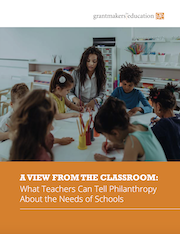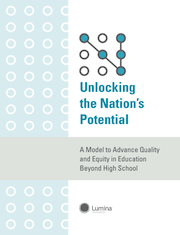Site Search
- resource provided by the Forum Network Knowledgebase.
Search Tip: Search with " " to find exact matches.

What can over a million teachers tell us about the needs of schools? This report digs into the data from 1.8 million teacher requests on the crowdfunding site DonorsChoose to tell the story from inside today's classrooms. We feel this data provides a roadmap for funders seeking to support students directly, but also for funders seeking broader reform of U.S. education policy and systems.

With the recent passage of the federal budget bill that slashed Medicaid and food assistance for millions of Americans while directing $170 billion to border militarization and the surveillance, detention, and deportation of immigrants, it is clear that private industry stands to profit while tearing families and communities apart. Indeed, between Trump’s election in November 2024 and April of this year, the stock prices of the nation’s two largest private detention facility operators, GEO Group and CoreCivic, soared 94% and 62% respectively – a pattern that the Brennan Center for Justice notes followed Trump’s first election. Indeed, in the immediate aftermath of the budget bill’s signing, both companies saw a further 3% increase in stock value.
With billions in philanthropic assets invested in financial markets, advocates have long called for divestment from private detention facilities and the broader prison-industrial complex. These efforts exist as part of the larger movement for divestment from the range of extractive industries that harm the very communities that foundations seek to support through their grantmaking. Numerous funders have taken up the challenge of revisiting their investment strategies to better align with their missions, with some also pursuing restorative grantmaking practices. In this session we’ll engage in a discussion with several of those funders, as well as an impact investment firm committed to advancing a regenerative economy.
This session will be an excellent opportunity for staff on both the investment and grantmaking sides of the house to learn first-hand what it looks like to operationalize divestment and impact investing strategies, so invite your colleagues and bring your questions!
Speakers
Hans How, Integrated Capital Officer, Restorative Economies Fund, Kataly Foundation
Alex Saingchin, Co-Founder & President, Just Futures
Rochelle Witharana, Chief Financial and Investment Officer, California Wellness
Moderator
Rachel Fagiano, Funders for Justice
Cost: Free
In this second session of GCIR’s Anti-Authoritarian Funder Learning Series, we will lean into the wisdom of advocates, pro-democracy funders, and influential thinkers to unpack the patterns of autocratic governance taking hold in the United States, and explore how philanthropy can help avert our democracy’s decline.
While broad swaths of the American public are grappling with the unmistakable and fearful evidence of our authoritarian drift, the good news is that we do not have to go it alone. The backsliding of democratic norms, attacks on civil society, and centralization of abusive executive power is a story that has played out countless times in fledgling and long-standing democracies alike. The brave, strategic, and resilient resistance of everyday citizens in those countries—along with the documentation and analysis of journalists and historians—offers us not just an understanding of the authoritarian playbook (such as vilifying migrant communities to rationalize immigration enforcement), but a roadmap out of it.
Join us as we learn from international advocates, as well as pro-democracy funders and advocates. Together, we will examine the strategies that have been deployed globally against democratic repression—and, crucially, how philanthropy can resource the movement infrastructure needed over the next 18 months to prevent the consolidation of autocratic rule in the United States.
This report highlights three philanthropic efforts to build the capacity of local communities in the West - The Ford Family Foundation’s Ford Institute Leadership Program, the Northwest Area Foundation’s Horizons Program, and the Orton Family Foundation’s Heart and Soul Community Planning Program.
